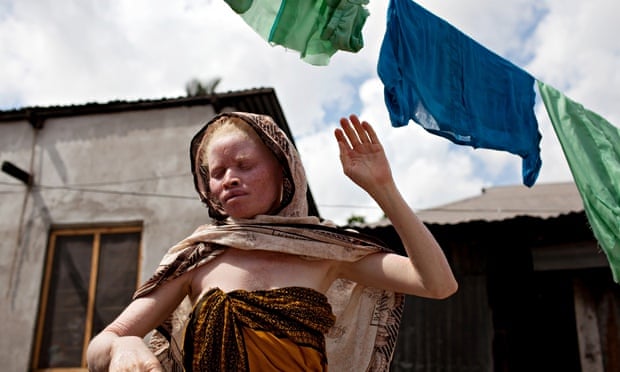Children with albinism have been placed in special homes to protect them from witchdoctors who believe their body parts bring good luck

Tanzania has banned witchdoctors in an attempt to combat a rise in the killing of people with albinism for their body parts, officials said on Wednesday.
At least 74 people with albinism have reportedly been murdered in the east African country since 2000. After a surge in 2009, the government placed children with albinism in special homes to protect them.
Witchdoctors believe their body parts bring good fortune and wealth. Isaac Nantanga, an interior ministry spokesman, told Agence France-Presse: "These so-called witches bear responsibility for the attacks against albinos."
The government and the Tanzania Albinism Society have agreed to form a taskforce to conduct special operations against the kidnaps, abductions and murders. But the society warned that a ban on witchcraft alone does not go far enough. Ziziyada Nsembo, its secretary-general, said on Wednesday: "It's just a starting point. The government should understand it is an endless story from 2006 until this time. No action has been taken to stop the killings."
A hereditary genetic condition that causes an absence of pigmentation in the skin, hair and eyes, albinism affects one Tanzanian in 1,400, according to experts. It affects just one person in 20,000 in the west.Witchdoctors may not be the ultimate source of the problem, she added. "We haven't seen where these hands, legs and skin are taken. This is the big question. If the witchdoctors will tell us that they are taken to somebody, and what purpose they are used for, we will be in a better position. Through the witchdoctors we can reach the real culprits. That is our one demand: for the government to find these people."
Body parts sell for around $600 in Tanzania, with an entire corpse fetching $75,000. A US survey in 2010 found that while most people in Tanzania are Christian or Muslim, 93% said they believed in witchcraft. Despite the scourge, only 10 people have been convicted of murder.
Last month a four-year-old girl was kidnapped from her home by men armed with machetes in the northern Mwanza region. Police have since arrested 15 people, including the girl's father and two uncles, but she remains unaccounted for.
Nsembo said: "The situation is so bad because people with albinism are afraid of going out and are not going to work. Children are hiding in the house. Mothers take children aged one and two to a special centre for their safety where they are like orphans: they lose the love of their mothers.
"It's because of a lack of knowledge. People don't understand that the difference is the skin but inside we're just the same."
The government has also launched an education campaign to end the killings. Home affairs minister Mathias Chikawe told AFP: "We are keen on addressing the issue of abductions and killings of people with albinism once and for all.
In August, a UN rights expert warned that attacks against people with albinism were on the rise ahead of Tanzania's October 2015 national elections, encouraging political campaigners to turn to witchdoctors for good luck."We are against those who cheat people [telling them] that they will be rich by possessing charms, as well as fortune tellers and those distributing talismans. People should also be repeatedly told that the only way of becoming rich is through hard work and not possessing charms."
Isaac Mwaura, a Kenyan MP with albinism, said Tanzanian gangs were crossing into neighbouring Kenya to carry out abductions.
"You can clearly see people in politics going for these concoctions," Mwaura told the BBC. "People will kill people with albinism in return for what they believe is this good fortune, and that is totally wrong. This problem has now become a regional problem because of Tanzania not having taken strong measures to curb it."
Tanzania's Daily News newspaper, in an editorial earlier this month, condemned the "disgusting" trade and said it had brought shame to the nation. The attackers "stalk unsuspecting people with albinism, pounce on them, hack off their body parts and run away with them," it said.
David Smith, Africa correspondent
The Guardian.UK
No comments:
Post a Comment